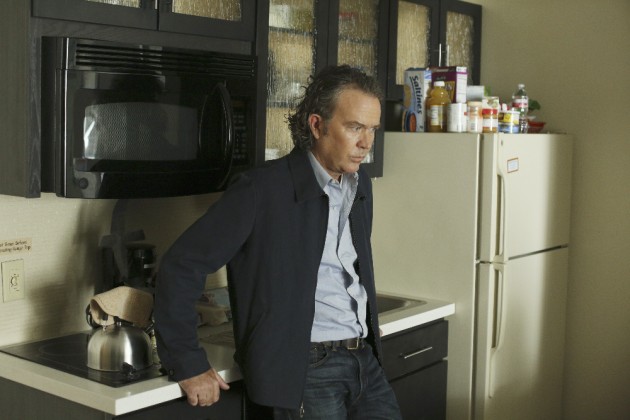
Ultimately, American Crime‘s first season will be judged on its resolution; each episode is constructed around building on the foundation of social inadequacies and politics of the pilot and deepening each story with tragic turns and emotional moments, all definitively building towards an ending. And this main line story, the one American Crime has used as the roots to branch off of, is deeply flawed, adhering to the single emotional thoroughline of hopelessness. Past lives, racial alignments, family drama… all of these melodramatic elements have undercut the points American Crime is trying to make, anecdotes about social justice and the legal system that are anything but subtle. That dourness has defined the series from the opening scenes, and when it’s finally lifted on one of the stories in “Episode Ten,” the show explodes to life, delivering one of the most effective sequences of the entire season.
And it happens away from the press, the family dramas of the Skokie family, and the plight of Carter Nix and Aubry Taylor’s “true” love – it happens in family court, the most boring, stoic setting the show’s offered thus far. Yet, that blank backdrop is the setting for what I’d argue is the show’s most important scene: Jenny’s testimony as a character witness for her brother, not only closing the loop of sibling conflict introduced early on, but establishing what inside Tony has allowed him to access the dark place, one that led him into disagreement with his father, and set his entire family down this difficult path. Her speech speaks to so many things beyond their relationship as brother and sister, a beautiful moment only heightened by the reaction shots of Alonzo and Tony providing brief interludes to the intense, wonderful dialogue she offers in that room.
Tony’s release might be the one shining moment for American Crime, and it’s in here that we can find hope for the recently-announced second season. A much more effective story is one that offers some semblence of hope; even on The Wire, we were given the ending of Bubbles’ story as an emotional counterpart to the inherent, repetitive failures of humanity on just about every other front. Without some kind of satisfying resolution, American Crime‘s entire story drowns in its own pessimism, whether it’s whatever Aubry is doing (which appears to be a major component of the show’s resolution, given how much attention is put on her character at the episode’s close), or Hector getting sent back to Mexico after providing the police the testimony they connived him into giving – these stories, while touching on realistic ideas, are so bleak that they end up operating outside an accepted reality, in a word where everything is so messed up and backwards, there isn’t much reason offered to keep fighting at all (an idea represented with Barb, but so late in the proceedings that it doesn’t generate much sympathy for her grating character).
That inkling of hope gives a balance to American Crime that the first season’s sorely missed, burying the inspirational moments and sharp cultural reflections under so many layers of futility against the systems of America, that it becomes a melodramatic slog to wash. Maybe that’s the point, after all, but presenting someone with a canvas of hopelessness isn’t a venue to rewarding television, or even enlightening television. Tony’s story benefits so much from that one positive touch: it doesn’t ignore the fact that to get Tony back, Alonzo had to sacrifice his business, most of his savings, and all of his dignity; that desperation speaks to the familial bonds that American Crime has struggled to depict as well.
When American Crime uses a little bit of light to cast its long shadows across society, it makes for moving, haunting television. Yet, those moments are far and few in between, lost in the darkness of a world where everything is horrible, and everything is going to go wrong for everybody (Aliyah and Carter have an interesting moment where he finds out he’ll still be getting pinned with minor charges, but it’s a light touch that doesn’t quite garner the attention of Jenny’s admission, the true climatic point of the episode). 75% of “Episode Ten” remains that sour on the world, be it in Aubry’s story or the distingeration of the Skokie family and any chance at justice/reconciliation; but that other 25% shows promise unseen throughout most of the season, a small reward for viewers who’ve stuck with the show’s overwhelming depression tactics in the first nine episodes.
[Photo via Ryan Green/ABC]
 Follow Us
Follow Us





